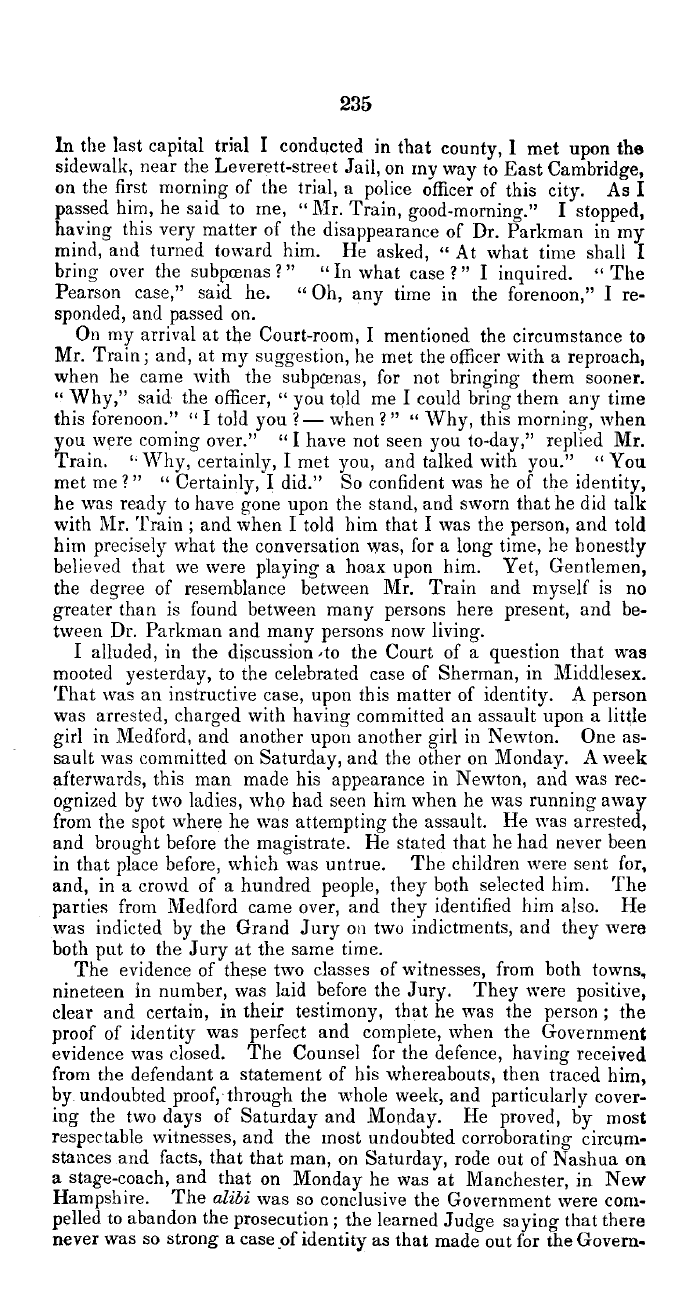|
235
In the last capital trial I conducted in that county, I met upon the
sidewalk, near the Leverett-street Jail, on my way to East Cambridge,
on the first morning of the trial, a police officer of this city. As I
passed him, he said to me, °' Air. Train, good-morning." I stopped,
having this very matter of the disappearance of Dr. Parkman in my
mind, and turned toward him. He asked, °° At what time shall I
bring over the subpoenas ? " « In what case ? " I inquired. " The
Pearson case," said he. « Oh, any time in the forenoon," I re-
sponded, and passed on.
On my arrival at the Court-room, I mentioned the circumstance to
Mr. Train; and, at my suggestion, he met the officer with a reproach,
when he came with the subpoenas, for not bringing them sooner.
', Why," said the officer, " you told me I could bring them any tune
this forenoon." " I told you ? - when ? " °' Why, this morning, when
you were coming over." °° I have not seen you to-day," replied Mr.
Train. " Why, certainly, I met you, and talked with you." '1 You
met me?" °° Certainly, I did." So confident was he of the identity,
he was ready to have gone upon the stand, and sworn that he did talk
with Mr. Train ; and when I told him that I was the person, and told
him precisely what the conversation was, for a long time, he honestly
believed that we were playing a hoax upon him. Yet, Gentlemen,
the degree of resemblance between Mr. Train and myself is no
greater than is found between many persons here present, and be-
tween Dr. Parkman and many persons now living.
I alluded, in the discussion ,to the Court of a question that was
mooted yesterday, to the celebrated case of Sherman, in Middlesex.
That was an instructive case, upon this matter of identity. A person
was arrested, charged with having committed an assault upon a little
girl in Medford, and another upon another girl in Newton. One as-
sault was committed on Saturday, and the other on Monday. A week
afterwards, this man made his appearance in Newton, and was rec-
ognized by two ladies, who had seen him when he was running away
from the spot where he was attempting the assault. He was arrested,
and brought before the magistrate. He stated that he had never been
in that place before, which was untrue. The children were sent for,
and, in a crowd of a hundred people, they both selected him. The
parties from Medford came over, and they identified him also. He
was indicted by the Grand Jury on two indictments, and they were
both put to the Jury at the same time.
The evidence of these two classes of witnesses, from both towns,
nineteen in number, was laid before the Jury. They were positive,
clear and certain, in their testimony, that he was the person ; the
proof of identity was perfect and complete, when the Government
evidence was closed. The Counsel for the defence, having received
from the defendant a statement of his whereabouts, then traced him,
by undoubted proof,- through the whole week, and particularly cover-
ing the two days of Saturday and Monday. He proved, by most
respectable witnesses, and the most undoubted corroborating circum-
stances and facts, that that man, on Saturday, rode out of Nashua on
a stage-coach, and that on Monday he was at Manchester, in New
Hampshire. The alibi was so conclusive the Government were com-
pelled to abandon the prosecution ; the learned Judge saying that there
never was so strong a case of identity as that made out for the Govern-
|

